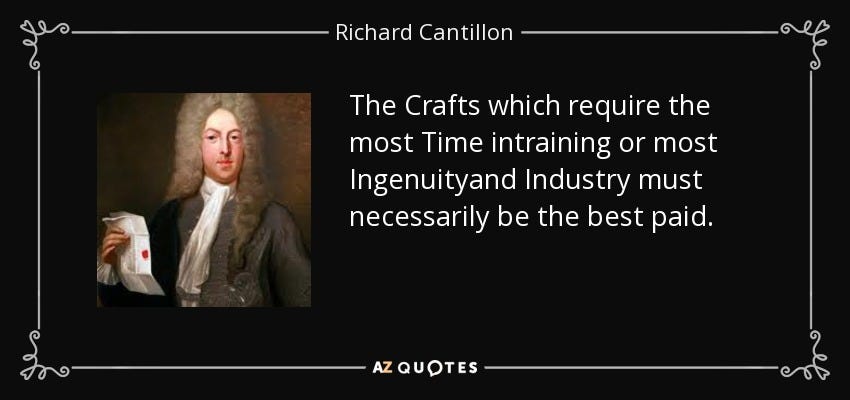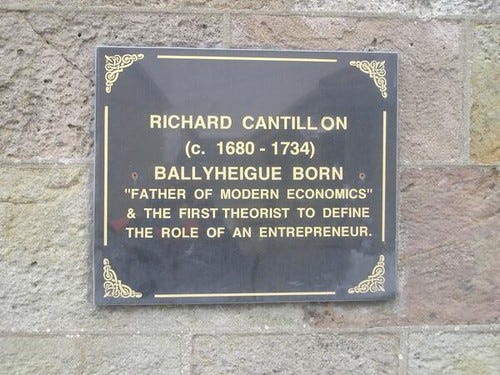Mission Accomplished
The Truth Addict Newsletter is a reader-supported publication. To support my work, consider becoming a paid subscriber (~$0.16/day).
An Essay on Economic Theory
Here is the first accurate translation of Richard Cantillon's 1755 masterpiece on economics. This treatise is widely credited with being the first to describe the market process as one driven by entrepreneurship. William Stanley Jevons, in the first blush of discovery, proclaimed Cantillon’s Essai, “the cradle of political economy.”
A cradle holds new life; and there can be little doubt that the Essai added new life to the organizing principles of economics. But “political economy” does not accurately describe the subject Cantillon addressed. Indeed, he scrupulously avoided political issues in order to concentrate on the mechanics of eighteenth-century economic life. When confronted by “extraneous” factors, such as politics, Cantillon insisted that such considerations be put aside, “so as not to complicate our subject,” he said, thus invoking a kind of ceteris paribus assumption before it became fashionable in economics to do so.
Murray Rothbard, for this reason, called Cantillon the "founding father of modern economics."
This book preceded Adam Smith by a generation. Unlike any previous writer, Cantillon explicated the vital role of the entrepreneur with perception and vigor. Hence, he deserves to be called “the father of enterprise economics.”
We know little of Cantillon’s life and the circumstances of his authorship. The manuscript that was eventually published in 1755 circulated privately in France for almost two decades before; when published, it appeared under mysterious circumstances.
Mark Thornton and Chantal Saucier have accomplished the arduous task of bringing forth a new and improved translation of Cantillon’s famous work. Heretofore the only English translation of the Essai available has been the 1931 edition produced by Henry Higgs for the Royal Economic Society. Though competent, it has become less serviceable over time, as more and more of its shortcomings devolved (not the least of which is the antiquated use of “undertaker” in place of “entrepreneur”).
Saucier provides a more accurate and lucid account, better suited to the 21st century. Thornton’s hand shows not only in competent guidance of the translator but in the inclusion of numerous explanatory footnotes that add historical context.
Robert F. Hébert writes the foreword.
Author:
The honor of being called the "father of modern economics" belongs not to its usual recipient, Adam Smith, but to a gallicized Irish merchant, banker, and adventurer who wrote the first treatise on economics more than four decades before the publication of the Wealth of Nations. Richard Cantillon (1680s–1734) — a proto-Austrian — is one of the most fascinating characters in the history of social or economic thought.
Foreword
Introduction
Part One: Production, Distribution, and Consumption
Chapter One: Wealth
Chapter Two: Human Societies
Chapter Three: Villages
Chapter Four: Market Towns
Chapter Five: Cities
Chapter Six: Capital Cities
Chapter Seven: The Labor of the Plowman is of less Value than that of the Artisan
Chapter Eight: Some Artisans earn more, others less, according to the different Cases and Circumstances
Chapter Nine: The Number of Laborers, Artisans and others, who work in a State is naturally proportioned to the Demand for them
Chapter Ten: The Price and Intrinsic Value of a Thing in general is the measure of the Land and Labor which enter into its Production
Chapter Eleven: The Par or Relation between the Value of Land and Labor
Chapter Twelve: All Classes and Individuals in a State subsist or are enriched at the Expense of the Proprietors of Land
Chapter Thirteen: The Circulation and Exchange of Goods and Merchandise as well as their Production are carried on in Europe by Entrepreneurs, and at a risk
Chapter Fourteen: The Desires, Fashions, and the Ways of Life of the Prince, and especially of the Property Owners, determine the Use to which Land is put in a State and Cause the Variations in the Market Prices of all Things
Chapter Fifteen: The Increase and Decrease of the Number of People in a State chiefly Depends on the Taste, the Fashions, and the Ways of Life Property Owners
Chapter Sixteen: The more Labor there is in a State the more the State is judged naturally rich
Chapter Seventeen: Metals and Money, and especially of Gold and Silver
Part Two: Money and Interest
Chapter One: Barter
Chapter Two: Market Prices
Chapter Three: The Circulation of Money
Chapter Four: Further Reflection on the Rapidity or Slowness of the Circulation of Money in Exchange
Chapter Five: The inequality of the circulation of hard money in a State
Chapter Six: The increase and decrease in the quantity of hard money in a State
Chapter Seven: Continuation of the same subject
Chapter Eight: Further Reflection on the same subject
Chapter Nine: The Interest of Money and its Causes
Chapter Ten: The Causes of the Increase and Decrease of the Interest of Money in a State
Part Three: International Trade and Business Cycles
Chapter One: Foreign Trade
Chapter Two: The Nature of Exchange Rates
Chapter Three: Further explanations of the Nature of Exchange Rates
Chapter Four: The variations in the proportion of values with regard to the Metals which serve as Money
Chapter Five: The augmentation and diminution of coin in denomination
Chapter Six: Banks and their Credit
Chapter Seven: Further explanations and enquiries as to the utility of a National Bank
Chapter Eight: Refinements of Credit of General Banks
Ways to connect
Telegram: @JoelWalbert
Email: thetruthaddict@tutanota.com
The Truth Addict Telegram channel
Hard Truth Soldier chat on Telegram
Mastodon: @thetruthaddict@noagendasocial.com
Session: 05e7fa1d9e7dcae8512eed0702531272de14a7f1e392591432551a336feb48357c
Odysee: TruthAddict
Donations (#Value4Value)
Buy Me a Coffee (One time donations as low as $1)
Bitcoin:
bc1qe8enf89g667dy890j2lnt637xqlt9wvc9f07un (on chain)
nemesis@getalby.com (lightning)
joelw@fountain.fm (lightning)
+wildviolet72C (PayNym)
Monero:
43E8i7Pzv1APDJJPEuNnQAV914RqzbNae15UKKurntVhbeTznmXr1P3GYzK9mMDnVR8C1fd8VRbzEf1iYuL3La3q7pcNmeN










